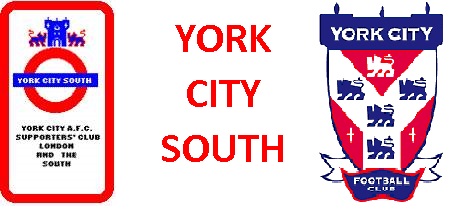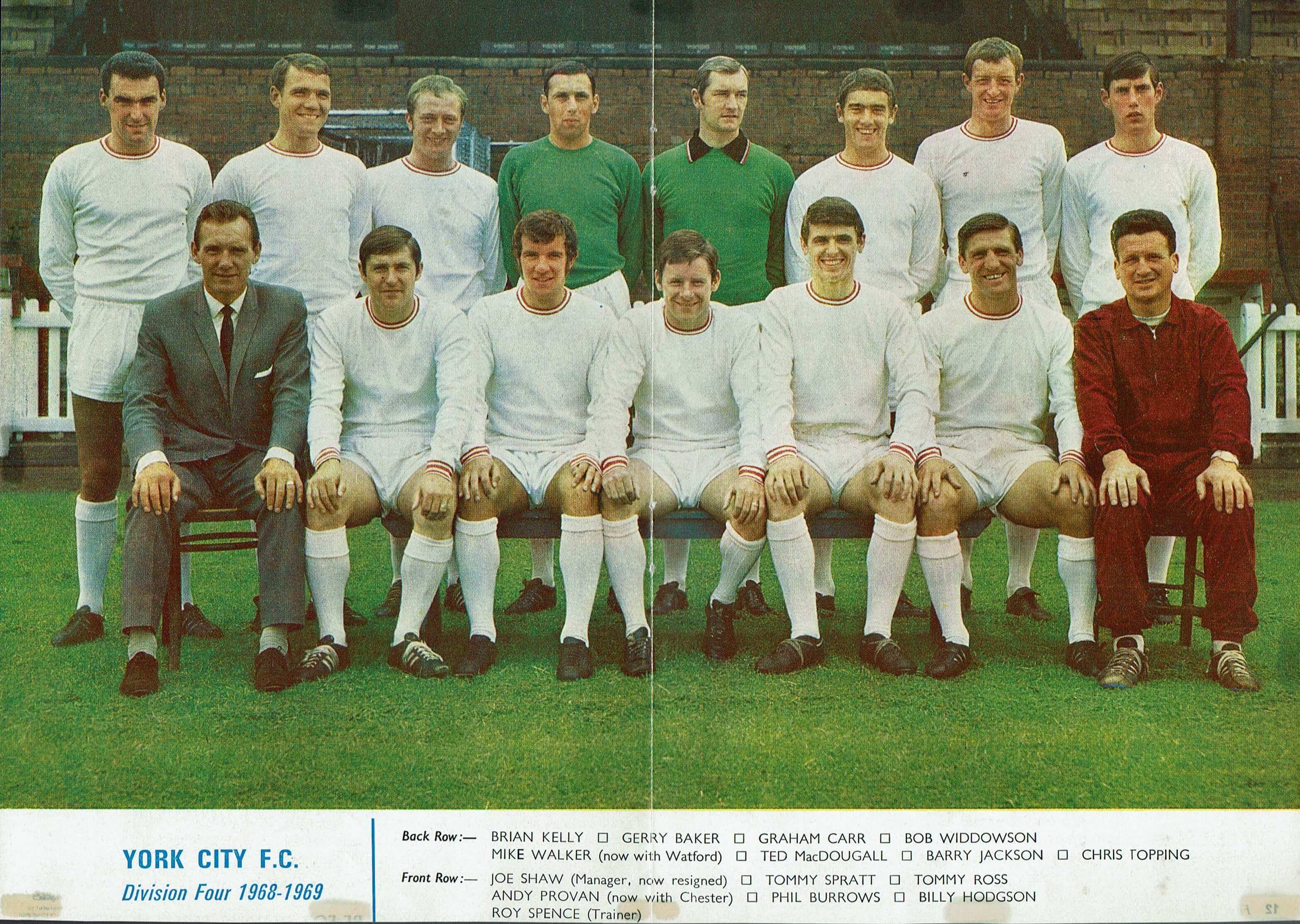

Ted MacDougall
“MacDou-Goal! The Ted MacDougall Story”
“MacDou-Goal! The Ted MacDougall Story” was published in 2016, nearly 50 years after his 2 year spell with City. It is largely a game by game, goal by goal account of his career with only rare insights into his character and the clubs he played for. Born in Scotland, he grew up in Widnes, he left school at 15 and took a job as a compositor. In those days, and every letter was individually into the print case before being committed to the newspaper. It worked well alongside his burgeoning progress in local amateur football; he was able to typeset headlines of his growing scoring prowess in bigger and bolder typeface than necessary. A successful trial at Liverpool followed, he signed amateur terms and quickly found himself in the “C" (fifth) team, fast progressing through the “B” and "A” sides into the reserves where he was displacing young professionals.
He signed his first pro contract in January 1966 for £16 a week, this being the first time he met Bill Shankly. He was named as sub on a couple of occasions later that season without coming onto the pitch as Liverpool were crowned English champions.
MacDougall suffered throughout the 1966/7 season from mononucleosis, “the kissing disease” which left him feeling lethargic for most of the season.
Post season, on a working holiday in Majorca, he was called back by Liverpool after seeing a newspaper headline, “MacDougall signs for York”. Back home, Shankly said he didn’t have to go, but after travelling to York, he agreed terms and signed for £24 a week (£16 at Liverpool) and the prospect of regular first team football. He later described dropping down from Division 1 to 4, as the “worst decision”, but it was the naivety of youth, the lure of money and first team football. Bringing him mum and gran to York, the deal was clinched over a hotel lunch when secretary George Teasdale treated them to egg and lettuce sandwiches. During his time in York, he topped up his wages by working on the racecourse during the summer.
MacDougall At York MacDougall tells tales of how City had one match ball; it was re-painted after every game and used again for the next match before it became worn out and was then used for training. Ron Spence’s physio role largely consisted of a jar of Vicks VapoRub, which he would rub on everything. When MacDougall asked him why he always used it, Spence replied, “I don’t know, but you never catch a cold”. A knock on the knee was treated by wrapping it in a dirty towel around and holding it over a sink where Spence would run hot and cold water over for it 45 minutes.
He had 3 managers at City:
He immediately struck on his debut in a 1-1 draw against Workington and was City's leading goalscorer in his first season. He became good friends with Tommy Ross, a fellow Scot.
In those days, training consisted largely of running and fitness work; there was very little tactical work. Friday training was England v Scotland 5 a side, “the hardest game of the week”.
MacDougall, with a goalscorer’s natural instinct was left largely to get on with scoring.
19 year old Phil Boyer joined City in 1968, described by MacDougall as an “exciting player with a sharp mind and good ball skills” (think Dale Banton). 2 games into the season, Joe Shaw resigned; it was over 2 months before Tom Johnston was appointed manager.
As MacDougall and Boyer's partnership grew, Boyer’s speed of thought and willingness to act as a provider saw the goals start to flow and drew attention from scouts.
He couldn’t save City from a second successive relegation campaign. He did finish as our top scorer for a second successive season with 25 goals. However, he was unhappy and asked for a transfer. Johnston’s first response was to ask MacDougall to take a pay cut.
He joined Bournemouth for a £10,000 fee, £28 a week, £7 per appearance, £500 signing on fee and £800 a year loyalty bonus. Manager Freddie Cox believing he was the man to score the goals as Bournemouth looked to improve their Division 3 status. Other clubs, including, Fulham, having suffered 2 successive relegations to Division 3 were reported as being interested in signing MacDougall. "I was on £25 per week at York, I met [then Bournemouth manager] Freddie Cox and Bournemouth were offering an extra £3. I said 'you need to throw in some curtains - and make them velvet'. It was only afterwards I thought 'I haven`t even got a house', so I signed for Bournemouth for an extra £3 per week and some velvet curtains... while having no house."
Teammate Andy Provan noted, "straight away, (I knew) he could play, he looked like a footballer, he was full of confidence, (but) he had no airs and graces".
Bournemouth His Bournemouth career got off to a slow start, his teammates included Roger Jones, Micky Cave and Eddie Rowles. Battling a cash crisis, players were sold and Bournemouth relegated, MacDougall again being top scorer for his team. Money was so tight, milk churns were used as weights.
That summer, John Bond was appointed manager. Initially, MacDougall didn't get on with Bond, being asked to play on the right wing. It was a two way thing. Eventually things clicked, in Bond’s “revolutionary” (for the time) coaching sessions, MacDougall learnt about movement, creating space, attacking the ball, whilst at the same time the players were taught to think for themselves and solve their own problems. With the cash crisis over, Bournemouth were spending big money. MacDougall recommended Boyer to Bond, a £15,000 bid was rejected by City with Blackpool, Luton and Middlesbrough looking on. An improved £20,000 bid saw Boyer join Bournemouth in December 1970, the partnership was re-united. However, the biggest clubs in England were already watching MacDougall closely.
That season finished with Bournemouth gaining promotion in 2nd place. City finished 4th to join the promotion party, but lost 4-0 at Bournemouth on the last day of the season. MacDougall recounts how City, with money tight, had no promotion celebrations planned, but joined Bournemouth in their celebrations that evening.
Bournemouth's big spending went on in Division 3. 2 promotion near misses followed, MacDougall becoming more prolific, after 6 goals in an FA Cup game with Oxford City, in November 1971, he scored 9 times in an 11-0 FA Cup win over Margate, an all time FA Cup record.
He acknowledges that John Bond was a big influence on his career, making him more aware of movement, attacking the ball and helping to build his self confidence.
2 Uniteds - 2 Disappointments Bournemouth started the 1972/3 season slowly, MacDougall become disillusioned. He asked for a transfer, many top flight clubs expressed an interest, but there was only one club he wanted to join. They were Manchester United, the club he idolised as a boy, for a £200,000 transfer fee in September 1972.
5 months later was he was on his way to West Ham for £150,000, having fallen out of favour with new manager, Tommy Docherty. Within another 9 months he was on his way to Norwich being re-united with John Bond.
He moved to Manchester United in 1972 for £160 a week, the same as Charlton, Best & Law, a £10 a week increase. He moved to WHU for just £100 a week.
At both Manchester United and West Ham, he found divided dressing rooms, “Them” (new boys) and “Us” (Charlton, Law etc.) at Manchester United where he was expected to change in the reserves’ dressing room and again at West Ham where the “golf” and “lager” factions held sway.
In his book, he appears to hold Bobby Charlton in low esteem whilst at WHU he recalls coming to blows with Billy Bonds in the showers after a game which effectively ended his spell there.
Norwich At Norwich, he found a home from home as John Bond signed up a good numberof Bournemouth players. Struggling Norwich couldn’t retain their top flight status, but MacDougall was reunited with Phil Boyer. Norwich immediately returned to Division 1 (a low point in their 1974/5 promotion campaign being losing both league games with York City).
1975 saw MacDougall make all his 7 Scotland appearances, scoring 3 goals.
Norwich comfortably retained their Division 1 status in 1976, McDougall scoring 28 goals, the top scorer in the league.
1976/7 was different. A slow start for Norwich and MacDougall became disillusioned. Having set up a successful sports shop business around the Bournemouth area, he hankered after a move closer to home, an area in which he'd already built his own home.
Down, Down, Too Quick? In recognition of his services, John Bond and Norwich allowed him to leave for a cut price £50,000 to join Southampton in Division 2. Boyer was to follow. It took 2 seasons, but Southampton regained Division 1 status. However once again, MacDougall despite scoring 7 goals in 12 games back in the top flight, felt lethargic and asked to leave. He left to re-join Bournemouth, dropping into Division 3.
Many felt he left both Norwich and Southampton too early.
2 seasons at Bournemouth followed before he went to Blackpool, re-joining Alan Ball, his ex-Southampton teammate. It didn't work out. MacDougall drifted out of league football, playing for various non league sides along the way.
Ted - The Man Outside football, “Ted MacDougall Sports”, a chain of sports' shops in the Bournemouth area prove to be lucrative as did various property developments.
Meeting his second wife, a French Canadian, he spent more time in North America, mixing property development with various football coaching and management roles as well as dipping his toes into software.
Back at Bournemouth, a stand is name in his honour (their Player of the Season award is named in memory of Micky Cave). He has been a regular visitor to Bournemouth, being instrumental in one successful rescue bid, and on one occasion, July 2015, he returned to York where he caught up with Chris Topping.
John Bond described him as a "complex character”, he seemed happiest as a player at Bournemouth and Norwich, possibly as a big fish in a small pond rather than Manchester United and West Ham where maybe his naturally introverted personality didn't allow him to show his best ability alongside some of the biggest names in the game at the time.
Maybe he was a man of his time, he freely admits he was an out and out scorer, he wasn’t a provider, he left the legwork to others, notably Phil Boyer, who crafted his goals.
At 5 foot 10 inches, he wasn’t particularly tall, but was surprisingly good in the air.
Forty goals in 90 appearances for York in 2 re-election campaigns marked him out as a natural predator. He netted 308 goals during his time as a Football League career.
Whatever, his goalscoring record was second to none, his goals at Norwich confirmed he was a striker of the very top class. Priceless in today’s transfer market.
